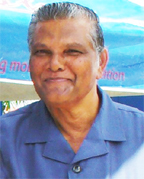‘We cannot fiddle our figures’, GT&T CEO says
Chief Executive Officer of the Guyana Telephone and Telegraph Company (GT&T) Major General (rtd) Joe Singh has debunked as “a fallacy” the notion that the local telecommunications service provider is simply “raking in” huge profits and passing these on to its parent company, Atlantic Tele Network.

In an extended exclusive interview with Stabroek Business, during which he also voiced GT&T’s concerns over the implications of “unregulated telecommunications traffic, Singh said public assertions that sought to imply that GT&T was simply racking up huge profits were inaccurate and unfair.
“This figment of the imagination that somehow we are raking in large sums of money and that that money is going to the parent company is nonsense. Anyone who thinks otherwise can refer the matter to the PUC [Public Utilities Commission] or to the Government of Guyana,” Singh said. He noted that the government owned 20 per cent of the company and had people sitting on the board. “… and we have to declare this financial information both to the government and to the PUC.”
Singh told Stabroek Business that GT&T wished to see an end to what he described as “the various bits of erroneous information on the company’s finances”, which he said was “creating unfavourable impressions in the minds of people.
“Here we are investing US$275 million over the last 20 years. We are paying 45 per cent corporation tax to the government on every dollar we earn; we are paying VAT and income tax which is deducted at source and we pay dividends. GT&T is hardly in a position to fiddle its financial information,” Singh declared.
And according to GT&T’s Chief Executive Officer, the company continues to honour its obligation to Guyana by investing in the development of the country’s telecommunications sector. He disclosed that during 2008 GT&T invested “nearly $6 billion in cellular and land line equipment.”
Meanwhile, GT&T says it will shortly be putting a service in place that will allow local internet cafes to legitimize the use of the company’s telecommunications infrastructure for their operations. The new system which is currently on trial and which is scheduled to come on stream in January 2009 will facilitate the legitimate sale of minutes to internet cafes through wholesalers who have already been identified by GT&T.
The move to regularize the operations of internet cafes comes in the wake of concerns expressed by GT&T over their unauthorized use of its telecommunications facilities to enable their international telephone and internet service operations.
Singh said that GT&T had neglected to move against those service providers with whom it has contractual arrangements and who have been making it possible for internet cafes to access its services.“We have taken a soft line on this transgression because we are aware that for the small operators this is a bread and butter issue. However, as soon as the system is in place which, in effect, allows cafes to legitimize their operations, we will be moving to shutdown any of our service providers who continue to make it possible for the illegal operations to continue.”
Singh outlined several reasons for GT&T’s concern over what he described as “the unregulated component” of telecommunications traffic. He said that GT&T and the government were losing around $59 million and $27 million a month, respectively, in revenue arising out of the unauthorized and unregulated use of its telecommunications infrastructure by internet cafes.
But according to Singh, financial loss was not GT&T’s only concern. He said that compliance with the provisions of the recently enacted Telecommunications Act is compromised by the fact that GT&T is not in a position to monitor traffic that does not pass through its system. “From a security standpoint, traffic coming in or going out outside of the GT&T network cannot be monitored. Given local and global security currents this should be of great concern to the Government of Guyana. We have made this point to the government umpteen times,” Singh said.
And according to Singh unregulated telecommunications traffic also places the company in breach of international law and, specifically, in breach of the Digital Millennium Compliancy Act, which seeks to guard against copyright infringement. “As a service provider we have an obligation to ensure that our network is not used for any infractions or infringements of copyright, whether it is downloading games, movies or another material. Whenever these infringements occur we receive advisories as to which of our customers have committed those infringements. As soon as we receive those advisories we remove our service to the customer and advise them of the infringement. The problem here is that we can do nothing about those infringements in cases where the perpetrators are not our legitimate customers,” Singh said.
Meanwhile Singh told Stabroek Business that the current bypassing of the GT&T infrastructure has been resulting in “a lot of bad press for the company” since “people assume that when they receive a call from overseas and the quality of the call is poor we are responsible. The truth is that we have no control over that and I believe that senior functionaries here in Guyana now realise that when they have difficulties with calls getting through to Guyana those calls are actually going through the bypass route.” He said that in order to seek to alleviate this problem GT&T has printed 600,000 US$5 and US$10 cards which can be purchased locally and taken or sent overseas to facilitate calls to Guyana. “Once they use that card they are automatically on to our network and the quality of those calls is far superior to anything that comes through the bypass system,” Singh said.
GT&T’s Director responsible for Rate Making Gene Evelyn told Stabroek Business that the sub-standard quality of the calls that circumvent the company’s network results from the fact that the calls travel by public internet rather than a proprietary network like that which is provided by GT&T.
